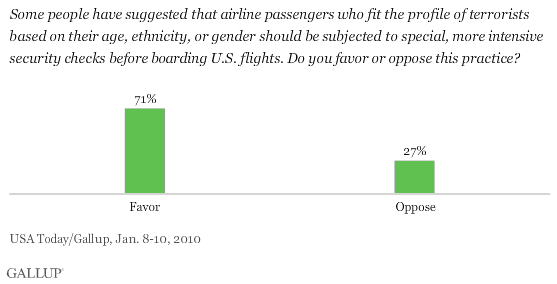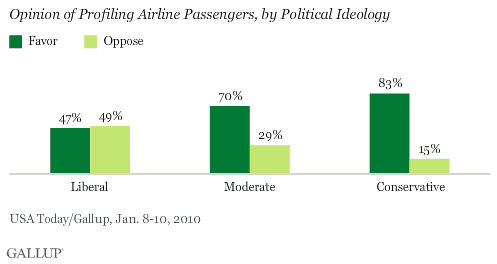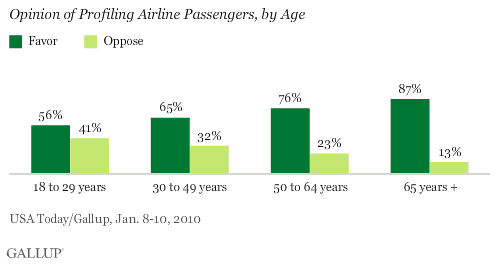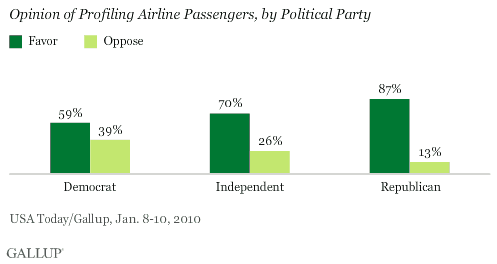PRINCETON, NJ -- Americans widely endorse the use of profiling to single out airline passengers for more intensive security searches before they board U.S. flights, based on their age, ethnicity, or gender. Seventy-one percent are in favor of this practice and 27% are opposed.

These results are based on a Jan. 8-10 USA Today/Gallup poll, conducted in the weeks after the attempted Christmas Day bombing of a Northwest Airlines flight headed for Detroit. The incident sparked renewed discussion of ways to tighten security measures at airports, ranging from expanding the government's "no fly" list to more widespread use of body scan machines at airports.
"Eighty-three percent of self-identified conservatives favor the use of profiling, compared with 47% of liberals."
The attempt has renewed debate over the use of profiling on the basis that terrorists generally have certain shared characteristics. The practice is used in Israel, a country noted for its tight airport security, but not in the United States. Two common objections to its use in the U.S. are the potential violation of individual civil liberties and unequal treatment for members of certain groups.
The poll results suggest that Americans seem to give greater weight to protecting citizens against possible terrorism than to protecting against potential violations of individual liberties.
The largest difference in support for profiling among key attitudinal or demographic subgroups is seen by political ideology. Eighty-three percent of self-identified conservatives favor the use of profiling, compared with 47% of liberals. At 70%, moderates are much closer to conservatives than to liberals in their views.

Apart from liberals, other subgroups show majority support for profiling, although the level of that support does vary. For example, 87% of senior citizens (those aged 65 and older) favor the use of profiling, compared with 56% of young adults (aged 18 to 29).

Non-Hispanic whites (74%) are more supportive than nonwhites (63%), and men (77%) are more supportive than women (65%).
The results by political party are generally similar to those for political ideology, though a majority of Democrats (59%) say they are in favor of profiling air passengers.

Bottom Line
Each attempted terrorist attack seems to bring a renewed call for heightened security measures. It is not certain that the U.S. government would ever seriously consider adopting profiling of air passengers based on their personal characteristics as a means of preventing terrorism. But despite concerns about the practice, most Americans seem inclined to favor it.
Survey Methods
Results are based on telephone interviews with 1,023 national adults, aged 18 and older, conducted Jan. 8-10, 2010. For results based on the total sample of national adults, one can say with 95% confidence that the maximum margin of sampling error is ±4 percentage points.
Interviews are conducted with respondents on land-line telephones (for respondents with a land-line telephone) and cellular phones (for respondents who are cell-phone only).
In addition to sampling error, question wording and practical difficulties in conducting surveys can introduce error or bias into the findings of public opinion polls.
